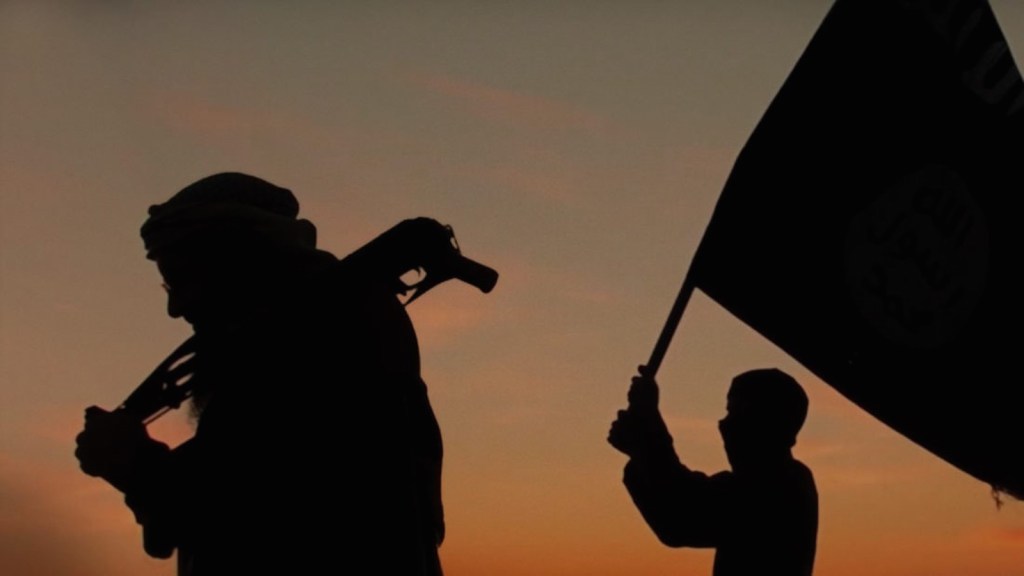Where there’s terror, there’s bravery—but adjectives feel insufficient when describing “Raqqa Is Being Slaughtered Silently” (RBSS), a collective of anonymous activists who banded together when their homeland was overtaken by ISIS in 2014.
In the face of extremism, the “underground journalistic-activist enterprise,” as David Remnick wrote in 2014, fought back with truth. Their ammunition came in the form of raw footage that captured the incalculable atrocities being committed by ISIS—the beheadings, sexual assault, and beyond. “Even in exile,” Remnick warned, “they are in no way safe.”
Videos by VICE
In the fall of 2015, documentarian Matthew Heineman (Cartel Land) discovered RBSS and was immediately captivated. Shortly after reaching out to the collective, he got to work. “I followed them in Turkey,” says Heineman, “and then eventually to Europe as ISIS continued to threaten them.” The result is City of Ghosts, a stirring portrait of daily life under ISIS. It manages to be cinematic without cheapening the plight of Syria, and it gives ample room to RBSS members like Abdel Aziz al-Hamza, a former biology student at Raqqa University turned fearless dissident.
“We believe in the Syrian revolution,” he tells me. “We knew sitting and watching would not help us.” It’s the hope of everyone involved in this project, especially Heineman, that this film will.
When we spoke with the director over the phone last week, he discussed his time on the ground with RBSS, why President Trump could find value in the film, and how we’re really at war with an idea.
VICE: As a documentarian, you’ve managed to consistently get your subjects to trust you. How do you approach these dynamics?
Matthew Heineman: Honesty and transparency are key. On the outset—for both Cartel Land and City of Ghosts—I’ve been very transparent with my intentions and my goal of ultimately gaining intimacy. The real key is time. I don’t just helicopter in and out and expect to get gold. I generally spend months and months building rapport. In this case, the fact that I was on the run with these guys as they were hiding in safe houses, “hunted by ISIS.” They’re in very precarious positions and intrinsically open to revealing their emotions. Trying to get them to do that was one of my goals from the beginning.
When you were on the ground with RBSS, was there something that especially surprised you?
What I didn’t know is that this would become an immigrant story—about finding one’s self in a new land, and what that means. It became a story of rising nationalism and the cumulative effects of trauma. I had seen the images of James Foley, people on Guantánamo streets being beheaded. I never fully understood ISIS studios, producing these deeply distributing images.
What did you learn?
ISIS is really an idea, and it’s not going to be beaten by guns, or bombs, or a ground defensive to regain Raqqa from ISIS. Even if we kick out ISIS from Raqqa, the ideology will remain. There’s a whole generation of children who have been indoctrinated by this ideology. We have to figure out ways as a global community to fight this extremist ideology.
How do we beat an idea?
By exposing the fallacy of that idea. In this world that we live in, where truth seems to be malleable, we need to find ways to expose the truth. I’m not a big Twitter-er, but the other day I retweeted a tweet from one of the founders of the group: “Raqqa is not ISIS and ISIS is not Islam.” That idea is important. This is a tiny percentage of this religion that has hijacked the narrative and created a culture of fear around the world.
Google has an initiative called Jigsaw, which is an attempt to fight extremism with the machine of Google. Two or three years ago, if you searched “I want to join ISIS,” in about 37 seconds you could have all the information needed to either fight in Syria or build a bomb. So one of the things that they’re doing is reverse engineering these searches to promote content like what’s coming out of RBSS. Instead of “how to join ISIS,” you’re going to find the atrocities this group is committing against Muslims in Raqqa.
Should he ever watch it, what do you think President Trump’s reaction to this film would be?
I’ve thought about that a lot. In the documentary form, it’s so easy to propagate your own beliefs or preach to the choir. But I strongly believe that one of the beauties of the documentary film is to introduce people to characters they may not otherwise get to meet and to worlds they may not otherwise get to see. One of my goals with the film is to celebrate journalism, but also provoke empathy for what’s happening in Raqqa and what’s happening to the Syrian people.
It was incredibly moving and tragic to premiere this film at Sundance. Our last screening was the day after the Muslim ban. To be on that stage with these guys when, if the festival was a week later, they wouldn’t be allowed in our country, was emotional. These guys are our allies in this fight against extremism, against ISIS. We need to be building bridges with Muslim communities around the world and not trying to shut them out.
Follow Sam Fragoso on Twitter.
More
From VICE
-

(Photo by Kristy Sparow/Getty Images) -

Tension Movies/YouTube -

Screenshot: Steam

